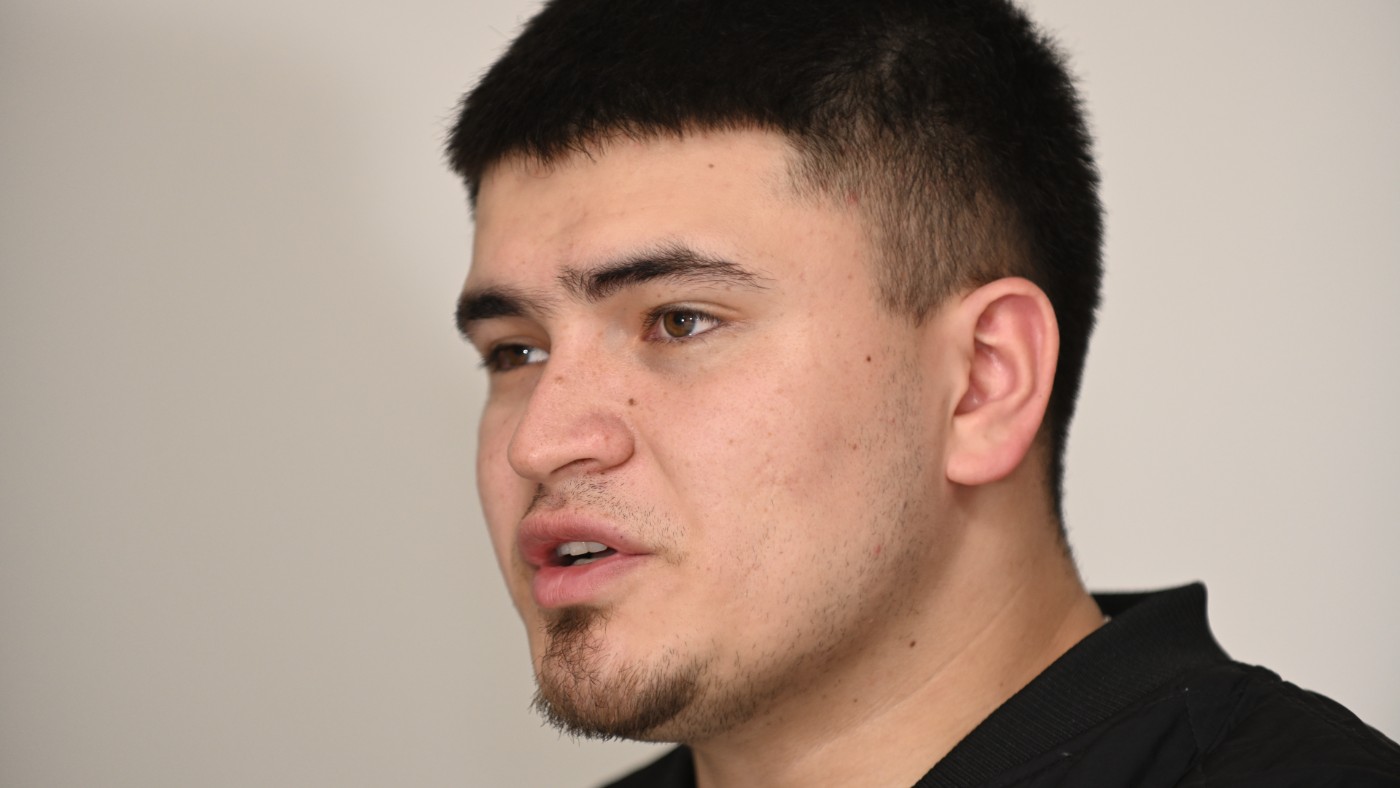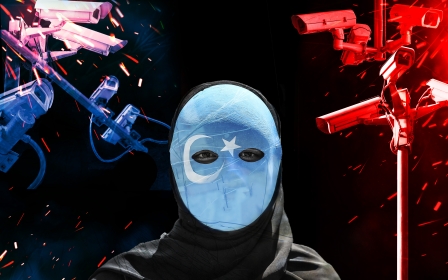Uyghurs in Turkey mourn Urumqi fire fatalities

“I can’t describe the pain I felt when I saw the photo,” Muhammed Memetali said. “I looked again and again. There were my mother and siblings, lying lifelessly.”
On 25 November a fire broke out on the 15th floor of a 21-storey apartment block in Urumqi, capital of the Xinjiang region in China’s far west. The building was subject to tight Covid-19 measures and its gates, including the fire exit, were locked.
Officially, ten people were killed. Among them were Memetali’s mother and four siblings. Yet some have claimed the death toll is in fact higher, and questions have been asked whether the strict Covid-19 measures prevented emergency services from getting to the victims in time. Some have also claimed that doors of the building were locked, which authorities deny.
“My mother and siblings would have been alive if the doors were not locked,” Memetali, who is from Xinjiang’s native Uyghur Muslim population, told Middle East Eye.
Memetali was speaking to MEE in an Istanbul suburb in a building that houses a Uyghur organisation called the Association of East Turkestan Scholars (East Turkestan is the name the Muslim population most often gives to the western regions of China that encompass Xinjiang).
Stay informed with MEE's newsletters
Sign up to get the latest alerts, insights and analysis, starting with Turkey Unpacked
Outside, the Kucukcekmece district is full of Uyghur restaurants and shops. Inside, books from the region line the wall.
Memetali was 16 when he came to Turkey in 2016. Aged 22 now, his sister Serafat, who also lives in Istanbul, was unable to come to the interview after seeing the photos of her mother and siblings lying dead back home in Urumqi.
The deadly fire is believed to have been sparked by a power strip in a bedroom on the 15th floor of the building.
“Our apartment is a few hundred metres away from a fire centre and one kilometre away from a hospital,” Memetali said. “How is it possible that they failed to come in time to rescue people?”
Videos shared on Chinese social media showed fire trucks arriving after the fire had engulfed the upper floors, with roads reportedly blocked because of China’s fiercely debated Covid-19 measures.
The mayor of Urumqi apologised and announced that an investigation into the incident would take place.
“I am not sure whether they would be late if the residents were not Uyghur,” Memetali said, showing his distrust of the Chinese authorities.
The plight of the Uyghurs
The north-western regions known to some as East Turkestan and their Muslim inhabitants have been subjected to an array of human rights violations since the Chinese captured them in 1949.
The suppression of religion, mass surveillance, forced conversions and the banning of the Uyghur language have all been reported under the pretext of combatting terrorism and modernising society. China has called the accusations “groundless”.
'My mother and siblings would have been alive if the doors were not locked'
- Muhammed Memetali, bereaved family member
In September, a group of UN experts who visited the region concluded that “the extent of arbitrary and discriminatory detention of members of Uyghur and other predominantly Muslim minorities… may constitute international crimes, in particular crimes against humanity.”
These crimes include torture, ill-treatment, rape, violence, arbitrary detention, experimental medical treatment, gynecological exams, forced abortion, and oppression of religious freedom.
China hit back, maintaining that “counter-terrorism and deradicalisation efforts in Xinjiang have been all along conducted on the track of the rule of law”.
Yet Beijing's definition of terrorism is vague and potentially includes causing social panic, wearing a costume or symbol advocating terrorism, and endangering public property.
Life under surveillance
What is not up for debate is how Memetali and other Uyghurs living in exile are experiencing all this, particularly in light of incidents like the Urumqi fire. The 22-year-old Uyghur is in no doubt about the level of surveillance taking place back in China.
“When I came to Turkey in 2016, I tried once to talk to my father,” he told MEE. The result was the detention of his father and older brother. “I don’t know where they are. I don’t know who will bury my mother and siblings in their absence. I don’t know if my father knows that his wife died.”
Abdurresid Eminhaci, general secretary of the Turkey-based Association of International East Turkestan NGOs, has suffered the same experience. His father was detained in 2017 without reason.
“We just know that he was given a five-year prison sentence but we don’t know his whereabouts,” Eminhaci told MEE.
“I am yearning to hear their voices but I know that if I try to, I’ll be harming them,” Memetali said of his surviving family back in Xinjiang.
“They are using our people as slaves not only in the camps but also in other construction projects,” Eminhaci claimed.
“For instance, they raid a house and choose men to be sent to inner cities to work on the Belt and Road project,” he said, referring to China’s global infrastructure plan.
Eminhaci believes China’s “goal is to destroy the Turkic and Muslim identity of Uyghurs”. Uyghur is a Turkic ethnicity, and its language is very similar to Turkish.
The Uyghur activist reeled off a long list of repressive Chinese tactics, including not allowing people to speak Uyghur, forcing them to abandon their religion, not letting them travel without a “valid reason”, banning social media and not allowing people to go to a mosque and pray.
Life in Turkey
In Turkey, exiles from China’s far west felt that they had found some space to vent their frustrations. The country has been a prominent destination for Uyghurs - a Turkish law allows issuing residence permits for people of Turkic descent.
Last week, a group of Uyghurs gathered in front of the Chinese consulate in Istanbul.
But the police reaction was unexpectedly severe, with the chief of police threatening those present with deportation.
Later that day, Turkey’s interior minister, Suleyman Soylu, issued a written statement in which he apologised and said that an “investigation was launched” into the police response. Soylu underlined the ethnic and religious ties between Turkey and the East Turkestan region.
“Everybody considers us as a brother here,” Memetali said.
Still, the 22-year-old implored the Turkish government to take further action and put pressure on its Chinese counterpart.
“I don’t understand why everybody turns a blind eye to East Turkestan while people are killed, detained, raped,” Memetali told MEE.
“Are we not humans? What is the crime that we committed? Why can’t I talk to my father? Why can’t I even attend my mother’s funeral? Why is everybody silent?”
Middle East Eye delivers independent and unrivalled coverage and analysis of the Middle East, North Africa and beyond. To learn more about republishing this content and the associated fees, please fill out this form. More about MEE can be found here.






